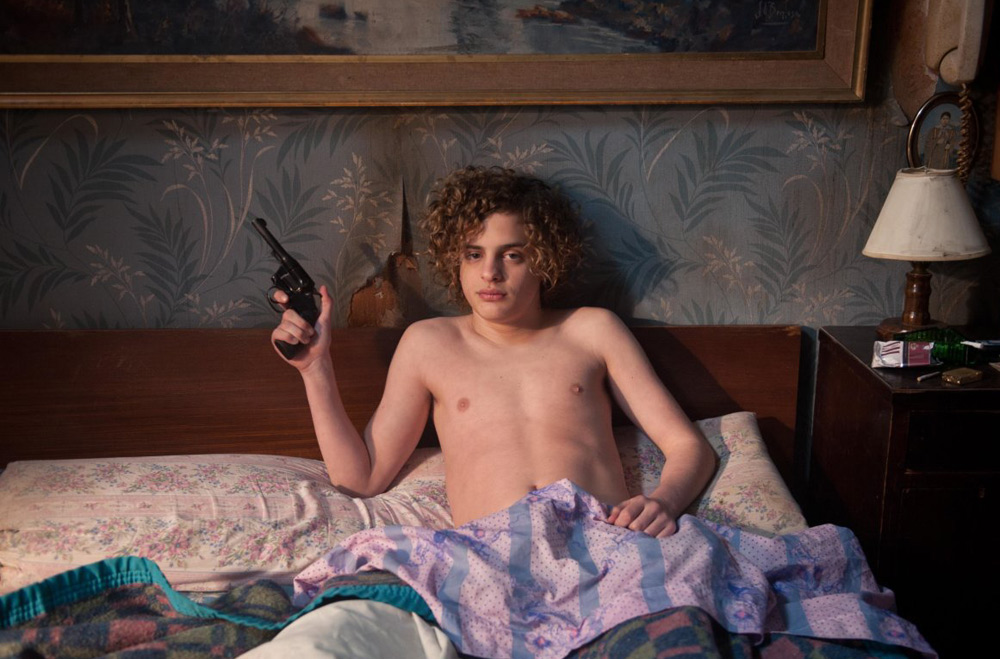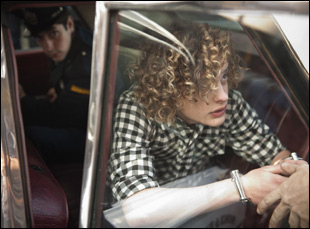“We all have a destiny. I was born a thief,” says Carlos (Lorenzo Ferro), the charming young scoundrel, at the start of Luis Ortega’s “El Angel.” Donning a mop of sandy blond locks that bob up and down as he bounces into a house that is not his, Carlos looks as apt to steal your heart as he is your jewelry, though just beyond the devil may care smirk he wears as a teenager in ‘70s Buenos Aires, there lies a blankness, devoid of the morals to suggest what he’s doing might be wrong, but also lacking passion in any moment in which he doesn’t face some sort of danger. He doesn’t just break into houses, but he dances inside them, tempting fate even more by blasting music at the highest volume.
While the good times aren’t likely to roll forever, they sure do seem to in Ortega’s exhilarating study of the smooth criminal, slinky and seductive as its central anti-hero who dabbles in petty larceny until he grabs the attention of a classmate named Ramón (Chino Darín), whose father Jose (Daniel Fanego) could use his help with some more ambitious scores. Carlos shows little interest in money, going so far as to tell Jose that he just gives any ill gotten goods to others “to make a good impression on people,” but having even this third-rate felon take an interest in him stirs something inside that his own parents, a humble vacuum cleaner salesman (Luis Gnecco) and his wife (Cecilia Roth), could not inspire. While Ortega and co-writers Sergio Olguin and Rodolfo Palacios take their own mild inspiration from the true story of a baby-faced serial killer known as the “The Angel of Death” who haunted Argentina in the early ‘70s, it is merely a departure point for a provocative twist on the story of a sociopath and innocence lost, told with the stylistic flourishes you might expect of a film produced by Pedro Almodóvar and his brother Agustín.
Underscored by music that runs the gamut from carnival music to an aching cover of “House of the Rising Sun,” “El Angel” has all the fun that Carlos thinks he’s having, watching as the blissfuly ignorant teen come alive committing crimes for which he can’t understand the consequences but far more uncomfortable in typical interactions where he can feel instant judgment if someone reacts to him differently than he had hoped. Ferro is quite affecting in the part, both playful and vulnerable when he isn’t projecting a stone cold confidence and bemusement when he’s in the thick of the action, and as wily as he is, Ortega matches him beat for beat with bold filmmaking that gives Carlos the cinematic treatment he thinks he deserves. During the Toronto Film Festival, the director spoke about the delightfully devious drama, which makes its way into American theaters this week, and how he drew on his own personal history to make “El Angel” both so detailed and unforgettable.
It’s inspired more by a real character than real events. As a kid, I grew up watching “Bonnie & Clyde,” “The Outsiders, “Rumble Fish,” all these films about juvenile delinquents and for some reason, you’re not with the cops, you’re with the kid. Then I read the story about this kid in Argentina who killed all these people and [the sensation revolves around the fact] he was beautiful, and society was shocked that someone beautiful could kill you. So I started reading all about this kid, thinking this is crazy as hell and it’s so mysterious it deserves a movie.
But it’s not what he actually did because I don’t know what he actually did. To be honest, it’s much more based on my youth than this character’s youth and I grabbed the fact that this was a popular case, which makes it much easier to pitch when you say, “Look, this happened and this character existed, but then I really tried to make the film of how I felt at that age and how I felt about doing illegal stuff. I never killed anyone of course, but I did break into houses and I really enjoyed it.
With my pal, we were 10 years old and his mother used to take us to break in houses and she had a real sexual relationship with us – we were only 10 or 11, so that’s why his friend’s mom has a sexual approach to him. I didn’t want to be tied to the real story, [starting from a perspective] to judge the fact it was a serial killer. Actually, I tried to avoid it.
Where did you find your lead actor Lorenzo?
I didn’t want anyone famous for the lead role because famous people are so unattractive in films. It’s fun to see them walk by [in real life] because you’re like, “Oh, there’s that guy,” but it ruins a film because you have to make yourself believe that you [don’t] know that guy and you know his Instagram account and know all his family, but now he’s playing this role. It’s so much better when the character’s unknown, so I was fixed on the idea he didn’t need to be famous and if it was possible, that he’d never have acted in his life because actors would come to the casting acting crazy. They would open their eyes and act all evil, but I was like, “No, don’t act crazy. That’s not what I’m looking for.” I didn’t want to do a film about evil. I wanted to do a film about how someone innocent could kill and not even think that he’s actually doing something bad – that’s what’s crazy about it. That’s what makes it worth a film.
I saw a thousand kids and he was the first one I saw. The first time he came, he ignored me completely and I thought, “You’re not going to see another actor come in here and ignore the director.” He’s the only one that did that and then I saw that he was insecure, but I liked the fact that he was not trying to show off, just acting indifferent and cool.
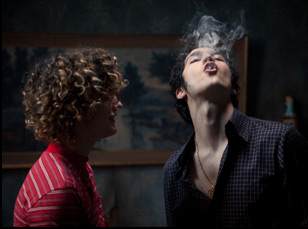
Yeah, because I had worked with her before and she’s a really intelligent actress. She’s a mother and she knows what it is to be a hostage of your own child because I’m not a father, at least yet, but anyone who has a teenage kid knows [a kid is] going to do whatever he fucking wants and you’re going to have to stand up for it. She knew exactly how that feels. You don’t sleep anymore. You think your kid is out there and something’s going to happen to him, but you never think he’s the one that’s going to do bad things to people. Also for me to put this [first-time unknown] actor in the lead role, I knew that he had to be surrounded by people with a lot of experience to make it a little even. And [Cecilia’s] great. All the actors I worked with I love.
What I loved so much about it is how it’s a game for him. Was that there from the start? I’m thinking of the scene where Carlos is playfully pointing the gun at his mother and you take the gun’s point of view.
It all started with this feeling that death is a set-up. [The idea] it’s not true. When I was a kid, I was sure that death was just part of this play that people were acting and I didn’t really think that you would die ever until some friends started dying. I was sure that wouldn’t happen, so the fact that this killer didn’t believe in death actually put him in a different situation because he’s not trying to do harm. He’s just trying to see if God exists, if someone’s going to be responsible for all of this or if this isn’t a joke. At the same time, he’s a character that’s very influenced by other films and the character thinks he’s in a film, so he walks like James Dean or Marlon Brando, even when he’s alone, just in case someone’s watching or God is watching. So you go into this spiral of madness [wondering] who you are and is this a set-up? It’s part of this paranoia you have when you’re a kid that you don’t know if everybody’s mocking you.
Did you actually find houses of the era for him to break into or is a lot of that great production design?
One of the things I also enjoyed is that it’s a movie that occurs in ’71/’72 and reality got much uglier [in the years after]. Cars got uglier, clothes got less stylish. [In] architecture, everything now is square, so it was really attractive to get out of this reality with the excuse that it was the ‘70s and we could find these really special places. The location guy was sending me pictures of these houses that are outside of this reality we live in now, which where the walls are (knocks on wood) [hollow], so we had a great team. It’s the first time I had a real team, like one person for each role. Before we were three doing everything, and it was really good training, but now I want to keep on working this way.
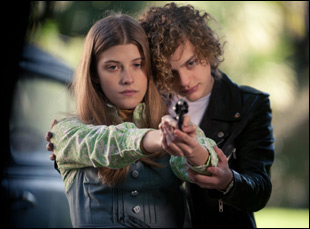
I tried to keep it real in my way and not do anything I wouldn’t [typically] do, but it’s a first time I had the money to film exactly what I [had in my head] because [usually], you just have to have these ideas that are possible according to your budget and here I was like, “Okay, I can crash two cars head-on.” [Other people were] like, “Yeah, but we could do it in post-production,” but I’m like, “No, let’s crash the cars. I want to see that. I want to be there.” You don’t get to do that in real life and you don’t get to do that [typically] in independent films, so what actually happened was my imagination was endorsed by reality. For the first time, I could really put it out there exactly what I imagined.
It was the first time I was free because of these incredible producers. I used to think I would never see this happen because I was more playing the outsider. I was okay with not being part of anything and now it’s still that way, but I like communicating with people. That’s the only thing that’s worthwhile about living, so I said, “Okay, I’m going to work for this to be exactly as I imagined it.” I was okay with failure for a while, but now I felt like I just had to make an effort to be myself, but learn how to write better, film better and say “Okay, I want to make a great film.” And this is a film I would want to watch at any age, but especially if I was a kid. It does really good with young people. The character actually breaks into places to have that feeling of being alive. He’s not for the money. He’s in it for the dancing.
How did you figure out the music?
I didn’t want to work with a composer because I didn’t want someone to interpret my ideas, and I think so much of the best music is already done, so I did intense research [into music] because it had to be from before ’71/’72. I used all Argentinean music from that era, but I discovered this [musician] many years ago called Moondog, who was called the “Viking of Sixth Avenue” in New York and he was blind. He’d just stand in the corner or be playing music in the street and he was a drifter. He ended up in Germany and he did most of the score of the movie, of course without knowing it – he died 40 years ago, but I was freaking out that this blind guy in New York from the ‘50s and ‘60s did most of the score. I don’t know how he got to record that music, how he got in to the studio and everything, but someone must’ve supported him.
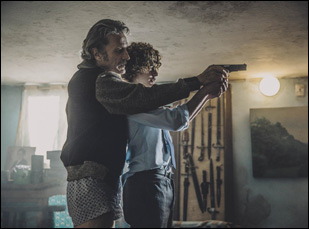
That’s my dad’s version. My dad is a singer and I really love that version of the song because it’s so emotional. He wrote that version for his mother – in Spanish, the lyrics are completely different and I had heard that song on a record from my father and it just moved me so much I thought it should be in a really special place, so It’s in one of my favorite and most romantic moments of the film.
At his first armed robbery, Carlos takes a painting that he hands above his bed. Was there anything significant about that particular piece?
I love that painter. His name is Carlos Alonso and he’s from Argentina and he’s an incredible painter. But I like the fact [Carlos the kid is] like an artist. He’s a performer. He’s attracted to art. He doesn’t even know it, but he just wants that painting, so it’s more important than anything. And that painting has some monsters and some military people and some prostitutes…it’s kind of like real life.
Is that how you might’ve gravitated towards film? That sensation that might not be too far removed from getting away with something?
Yeah, I didn’t know art existed as something that was created by someone else. The first time I saw art, I just thought it was the ocean or the flowers. I didn’t know there was a creator behind it. When I would watch films as a kid, I didn’t know there was a script or a director. I just completely believed that [world] and that’s why I don’t like working that much with famous people because it takes that away. But for me, it’s like you end up in a nuthouse or dead or in jail. Or you do films.
“El Angel” opens on November 9th in Los Angeles at the Nuart and New York at the Angelika Film Center.




